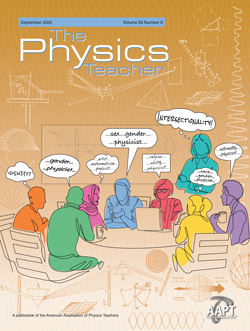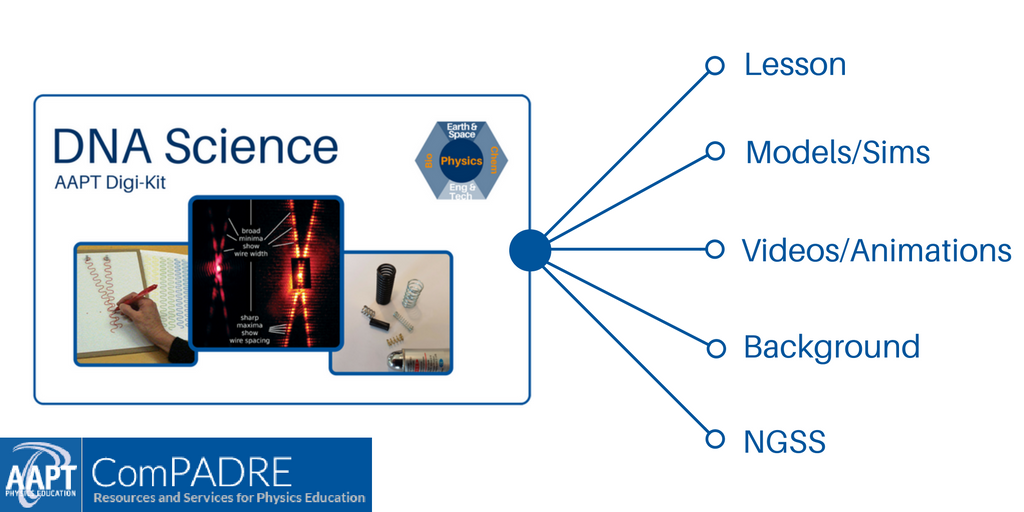The Physics Teacher
Volume 58 Issue 6
September 2020
Sex, Gender, and Physics Teaching, Continued
This month's cover provides a glimpse of a physics class continuing the conversation about “Sex, Gender, and Physics Teaching” that was started with our May 2020 issue of TPT. The articles marked with the pink and gray thumbnail image are part of the special collection. (cover art by Jen Geanakos)
Since August 1, 2014, the submission process for articles for The Physics Teacher has required authors to submit their article and cover letter at this website: http:www.editorialexpress.com/tpt. Starting June 10, 2020, the submission process for articles for The Physics Teacher will change. On or after June 10th, authors should submit their article and cover letter at this website: http://tpt.peerx-press.org/.
Columns
And the Survey Says..., Astronotes, Figuring Physics, iPhysicsLabs Little Gems, Physics Challenge for Teachers and Students, Fermi Questions, Talkin' Physics, Technology In The Classroom, Visual Physics, and Websights.
Editorial
Sex, Gender, and Physics Teaching, Continued by Gary White and Geraldine L. Cochran. DOI: 10.1119/10.0001823
LETTERS TO THE EDITOR
Ground rainbows: A cautionary tale for authors and editors alike by Markus Selmke. DOI: 10.1119/10.0001824
Rainbows not due to total internal reflection by Jukka O. Mattila. DOI: 10.1119/10.0001825
Special relativity algebra by Edw. S. Ginsberg. DOI: 10.1119/10.0001826
When order matters by William Brian Lane. DOI: 10.1119/10.0001827
GUEST EDITORIAL
Recommendations for emergency remote teaching based on the student experience by Bethany Wilcox and Michael Vignal. DOI: 10.1119/10.0001828
Papers
Why Aren’t More Theories Named After Women? Teaching Women’s History in Physics by Beth Parks. DOI: 10.1119/10.0001830
Parenting and Physics: How to Support Physics Students Who Are Raising Children by Rose Young. DOI: 10.1119/10.0001831
Rolling Soup Cans Down an Inclined Plane by Thomas B. Greenslade Jr. DOI: 10.1119/10.0001832
An Approach to a Physical Understanding of Color Mixing by Tina Schulze, Günter Quast, Antje Bergmann and Roman Dengler. DOI: 10.1119/10.0001833
The Mass of Hatchling Tyrannosaur and Sauropod Dinosaurs by Joshua D. Thomas, Scott A. Lee, Max Cooley and Richard E. Irving. DOI: 10.1119/10.0001834
Sex and Gender as Non-binary: What Does this Mean for Physics Teachers? by Adrienne Traxler and Jennifer Blue. DOI: 10.1119/10.0001835
Gender, Self-Assessment, and Classroom Experiences in AP Physics 1 by Marta R. Stoeckel. DOI: 10.1119/10.0001836
Seeing Is Believing: Demonstrating the RC Time Constant Visually by M. Qasim Syed and Ian Lovatt. DOI: 10.1119/10.0001837
Development of an Energy Science Curriculum by P.-M. Binder, Topaz P. Collins and Kristal Blacksmith. DOI: 10.1119/10.0001838
Ya Basic: Examining the Duality of Minority-Serving Conference Experiences by Xandria R. Quichocho. DOI: 10.1119/10.0001839
Betting on Better Buoyancy? Be Careful What You Wish For by Wilson J. González-Espada and Brooke S. Jones. DOI: 10.1119/10.0001861
Catapult Description of Magnetic Fields and Forces by Martin McCall, Paul Kinsler and Vijay Tymms. DOI: /10.1119/10.0001840
Using Arduino Uno Microcontroller to Create Interest in Physics by Amtul Mujeeb Chaudry. DOI: 10.1119/10.0001841
Determining Transistor Characteristics with Arduino by Fatih Önder, Esra Bilal Önder and Mehmet Oğur. DOI: 10.1119/10.0001842
Physics in Chavruta – A Model for Supporting Early Career Teachers by Shulamit Kapon and Alina Colton. DOI: 10.1119/10.0001843
Active Learning in an Inequitable Learning Environment Can Increase the Gender Performance Gap: The Negative Impact of Stereotype Threat by Alexandru Maries, Nafis I. Karim and Chandralekha Singh. DOI: 10.1119/10.0001844
A Low-Cost 3D Printed Meterstick Caliper Jaw by Steve Campolo. DOI: 10.1119/10.0001845
Race and Physics Teaching Collection Resource
DNA Science Lesson & Digi-Kit
Inspired by an article from The Physics Teacher, this multidisciplinary lesson and digital resource collection is based on How Rosalind Franklin Discovered the Helical Structure of DNA: Experiments in Diffraction (Braun, Tierney, & Schmitzer, 2011). Click the image to access this resource.



